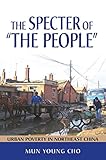The Specter of "the People" : Urban Poverty in Northeast China / Mun Young Cho.
Material type: TextPublisher: Ithaca, NY : Cornell University Press, [2013]Copyright date: ©2013Description: 1 online resource (232 p.) : 9 halftones, 2 tables, 1 mapContent type:
TextPublisher: Ithaca, NY : Cornell University Press, [2013]Copyright date: ©2013Description: 1 online resource (232 p.) : 9 halftones, 2 tables, 1 mapContent type: - 9780801451652
- 9780801467431
- 339.46095184 23
- HC428.H34 C46 2016
- online - DeGruyter
- Issued also in print.
| Item type | Current library | Call number | URL | Status | Notes | Barcode | |
|---|---|---|---|---|---|---|---|
 eBook
eBook
|
Biblioteca "Angelicum" Pont. Univ. S.Tommaso d'Aquino Nuvola online | online - DeGruyter (Browse shelf(Opens below)) | Online access | Not for loan (Accesso limitato) | Accesso per gli utenti autorizzati / Access for authorized users | (dgr)9780801467431 |
Browsing Biblioteca "Angelicum" Pont. Univ. S.Tommaso d'Aquino shelves, Shelving location: Nuvola online Close shelf browser (Hides shelf browser)

|

|

|

|

|

|

|
||
| online - DeGruyter The Other Welfare : Supplemental Security Income and U.S. Social Policy / | online - DeGruyter The Life Informatic : Newsmaking in the Digital Era / | online - DeGruyter Cauldron of Resistance : Ngo Dinh Diem, the United States, and 1950s Southern Vietnam / | online - DeGruyter The Specter of "the People" : Urban Poverty in Northeast China / | online - DeGruyter Mothers Unite! : Organizing for Workplace Flexibility and the Transformation of Family Life / | online - DeGruyter The French Revolution in Global Perspective / | online - DeGruyter Empire of Language : Toward a Critique of (Post)colonial Expression / |
Frontmatter -- Contents -- Preface -- Acknowledgments -- Introduction -- Chapter 1. In Search of "the People" -- Chapter 2. Gambling on a New Home -- Chapter 3. On the Border between "the People" and "the Population" -- Chapter 4. The Will to Survive -- Chapter 5. Inclusive Exclusion -- Chapter 6. Dividing the Poor -- Conclusion -- Notes -- References -- Index
restricted access online access with authorization star
http://purl.org/coar/access_right/c_16ec
Despite massive changes to its economic policies, China continues to define itself as socialist; since 1949 and into the present, the Maoist slogan "Serve the People" has been a central point of moral and political orientation. Yet several decades of market-based reforms have resulted in high urban unemployment, transforming the proletariat vanguard into a new urban poor. How do unemployed workers come to terms with their split status, economically marginalized but still rhetorically central to the way China claims to understand itself? How does a state dedicated to serving "the people" manage the poverty of its citizens? Mun Young Cho addresses these questions in a book based on more than two years of fieldwork in a decaying residential area of Harbin in the northeast province of Heilongjiang.Cho analyzes the different experiences of poverty among laid-off urban workers and recent rural-to-urban migrants, two groups that share a common economic duress in China's Rustbelt cities but who rarely unite as one class owed protection by the state. Impoverished workers, she shows, seek protection and recognition by making claims about "the people" and what they deserve. They redeploy the very language that the party-state had once used to venerate them, although their claim often contradicts government directives regarding how "the people" should be reborn as self-managing subjects. The slogan "serve the people" is no longer a promise of the party-state but rather a demand made by the unemployed and the poor.
Issued also in print.
Mode of access: Internet via World Wide Web.
In English.
Description based on online resource; title from PDF title page (publisher's Web site, viewed 02. Mrz 2022)


